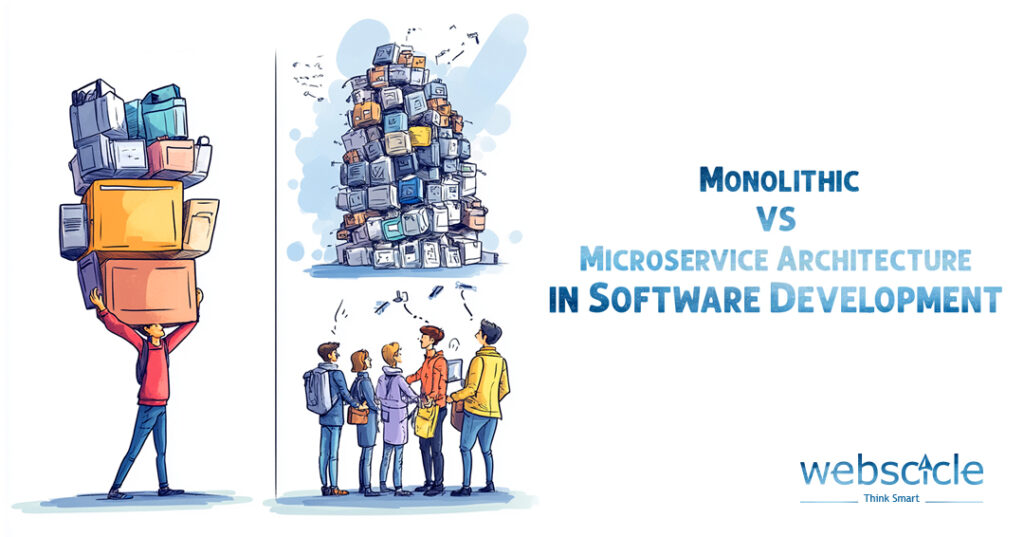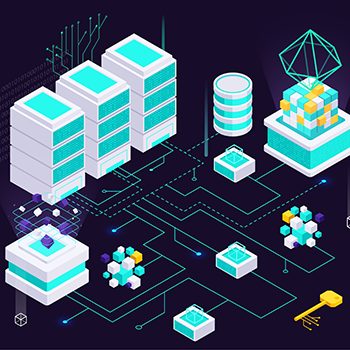Monolithic vs Microservice Architecture: Choosing the Right Approach for Your Software

Choosing the right architecture pattern when developing a software is very important. Whether you are working as part of an IT company, a software development company or a mobile app development company, be it in Silicon Valley or an IT hub in Kerala, understanding the differences between monolithic architecture and microservice architecture can help you make an informed decision. We have put together this blog taking the expert opinion from our developers working at Webscicle IT Company in Kerala to help you understand the difference between Monolithic vs Microservice Architecture in Software Development.
Microservice Architecture

In Microservice Architecture design approach, an application is built as a collection of small, independent services that communicate with each other through APIs.
Each service is responsible for a specific business capability and can be developed, deployed, and scaled independently.
This architectural pattern is ideal for large and complex applications that require flexibility and agility.
Since each service operates independently, the whole application can be easily scaled up in future without having to rewrite hundreds of lines of code.
Advantages of Microservice Architecture
High Scalability: Since each service operates independently, new features can be added to the existing software without interrupting the existing services. It works like a plug-in model where additional services can be added on without affecting the existing architecture.
Fast Development Process: Each service can be split up and given to a team to work on independently. This speeds up the development process. This also means that if your team comprises of developers with expert in mixed languages, they can utilise the language of their choice for development of a particular service without having to change the development language of the entire software.
Improved Fault Isolation: Since the application as a whole works as a collection of small services, failure of one isolated service won’t impact the working of the whole application. It will only affect the feature handled by that particular service. This ensures that your software continues to work while you do debugging or maintenance work on one specific service.
Monolithic Architecture

In Monothic Architecture design approach, the entire application is built as a single unit. All the necessary components of the application run as a single process. This type of design pattern is used for small, less complex applications.
Advantages of Monolithic Architecture
Simplified Development Process: In monolithic architecture approach, the development process will be simplified if only a small team of developers is working on the project. This means you don’t have to worry about building completely different services to work and later worry about the interconnection of all those APIs. Everything can be completed with a single code repository.
Easy Deployment Process: Since the entire software is developed as a single unit, the deployment process can be fast and easy. You only have to worry about deploying a single code base.
Monolithic vs Microservice Architecture
Criteria | Microservices | Monolithic |
Flexibility | High – Independent services can be updated or replaced without impacting others | Low – Changes require redeployment of the entire application. |
Scalability | High – Individual services can be scaled independently. | Low – Scaling requires scaling the entire application. |
Deployment | Continuous Deployment – Each service can be deployed independently | Unified Deployment – Entire application is deployed at once. |
Development Complexity | High – Requires managing multiple services and inter-service communication. | Low – Single codebase simplifies development and debugging. |
Fault Isolation | High – Failures in one service do not affect others. | Low – Failure in one component can impact the entire application. |
Performance | Potentially Lower – Network overhead from inter-service communication. | Potentially Higher – No network overhead within the application. |
Maintenance | Moderate – Requires managing multiple services but easier to update individual parts. | Simple – Single codebase, but can become difficult as the application grows. |
Technology Stack Diversity | High – Different services can use different technologies. | Low – Typically uses a single technology stack. |
Conclusion
When it comes to software development architecture, there is no clear-cut answer as to which one is better. The choice of development depends on your project complexity, time constraints, available resources and the team expertise. This comparison, monolithic vs microservice architecture must always be in mind when starting a new software project. A good software development company with expertise in developing software architectures can always help select the best architectures for your project.
If you are looking for an IT company in Kerala to develop Softwares, mobile applications or web applications for you, feel free to approach Webscicle.